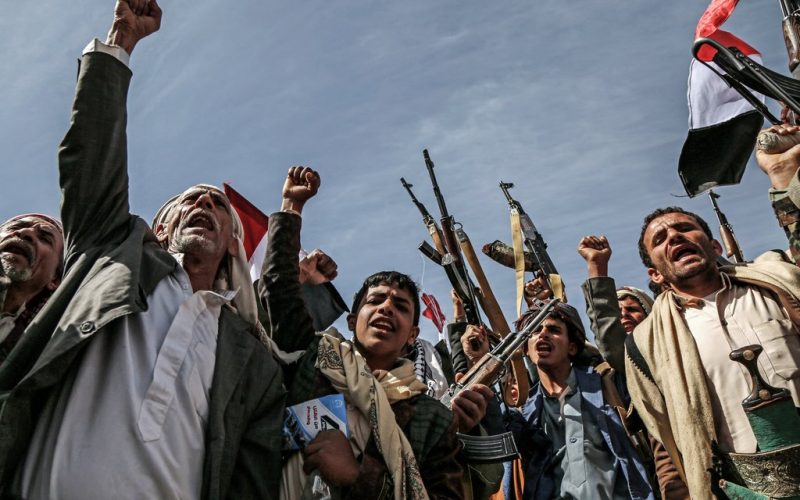Four years ago, they thought they could defeat the Houthis quickly. But the Yemenis turned out to be tougher than expected.
As the war in Yemen marks the end of its fourth year this week, it is clear that, with the aid and complicity of the United States and United Kingdom, Saudi Arabia and the United Arab Emirates (UAE) have savaged an impoverished country.
Yemen’s infrastructure has been laid waste to, as has some of its most productive farmland. The result has been the worst humanitarian crisis on the planet.
Yet despite this destruction, Yemen has turned into Saudi Arabia’s Vietnam. Ditto for the UAE. The two countries have sunk billions of dollars and countless troops and mercenaries into what has become a quagmire of catastrophic proportions.
What they had hoped would be a decisively quick war has turned into an albatross, with the rest of the world now questioning their motivations and urging their Western helpmates to withdraw support immediately.
The overt reason for Saudi and Emirati involvement is to defeat the Houthi rebels, a Zaidi Shia group with deep roots in Yemen.
Yet this hasn’t been achieved. The two Gulf States claim that the Houthis are proxies for Iran, but it has become increasingly clear that they are fiercely independent, and while they receive limited aid from Tehran, they do not take orders.
Saudi and Emirati leaders would do well to learn from Yemen’s 2,000-year history of draining the blood and coffers of imperial and lesser powers. The Yemenis defeated the Romans, the Ottoman Turks twice, and evicted the British in 1967.
They also defeated the Egyptians who invaded in 1962.
Much like the U.S. in Vietnam more than 40 years ago and more recently in Afghanistan, the goliath invaders are fighting a war of attrition, bleeding their resources, and losing whatever moral and political authority they might have had in the process.
Because it has a slightly more competent mercenary army, the UAE has the lead over Saudi Arabia in this regard. It’s set up military bases throughout southern Yemen where it supports separatists of various stripes who want everything from an independent south Yemen to an Islamic emirate.
Not content with just occupying the mainland, the UAE has also established bases on the once pristine Yemeni island of Socotra—a UNESCO world heritage site—and the island of Perim.
Saudi Arabia is playing catch-up with its ally and is laying claim to the governorate of al-Mahra in eastern Yemen. There, Riyadh hopes to build a pipeline that will allow it to bypass the Strait of Hormuz.
However, as in other parts of Yemen, the people are fighting to stop what many view as a land grab by a foreign power.
Residents of al-Mahra protested the construction of a Saudi-funded madrassa that would have undoubtedly used Saudi schoolbooks, the same schoolbooks that were used by the Islamic State Residents are also blocking the construction of a Saudi military base.
Both countries have much to learn from America’s costly misadventures after 9/11.
Despite fielding the world’s most capable armed forces and spending several trillion dollars, the U.S. failed to achieve its aims in Iraq or Afghanistan, a country that is in many respects similar to Yemen.
In Iraq, the invasion destroyed much of that country and paved the way for the rise of the Islamic State, as well as driving Baghdad into Iran’s open arms. In both nations, new and deadlier strains of extremism grew out of the power vacuums that were created.
The war in Yemen will have similar results. By continuing to fight the Houthis, Saudi Arabia and the UAE are paradoxically strengthening their enemies and providing Iran with more fertile ground for its influence operations.
The Houthis are superb fighters, but have shown less competence with regard to governance. The war and Saudi and Emirati airstrikes have enhanced the Houthis’ legitimacy by allowing them to do what they do best: fight.
It may be years before Yemen is a unified country with a functioning government again. In fact, Yemen may never again be unified. However, the UAE and Saudi Arabia are unlikely to ever see a return on their investment.
Even a cursory reading of Yemen’s history would have told them this. And failing that, an examination of America’s failed wars should have dissuaded them from becoming involved in the first place.
Without sustained international pressure on Saudi Arabia, the UAE, and Iran, the war in Yemen will continue for years to come.
All the while, it will drain both the UAE and Saudi Arabia of billions of dollars, spawn new militant groups, and ironically provide Iran with more opportunities to expand its influence.
Most critically, the war will continue to kill, maim, starve, and impoverish tens of thousands of Yemeni civilians.
Ironically, while Yemen may never be conquered, there might not be anything left worth conquering in the end.
Michael HORTON
The 21st Century

